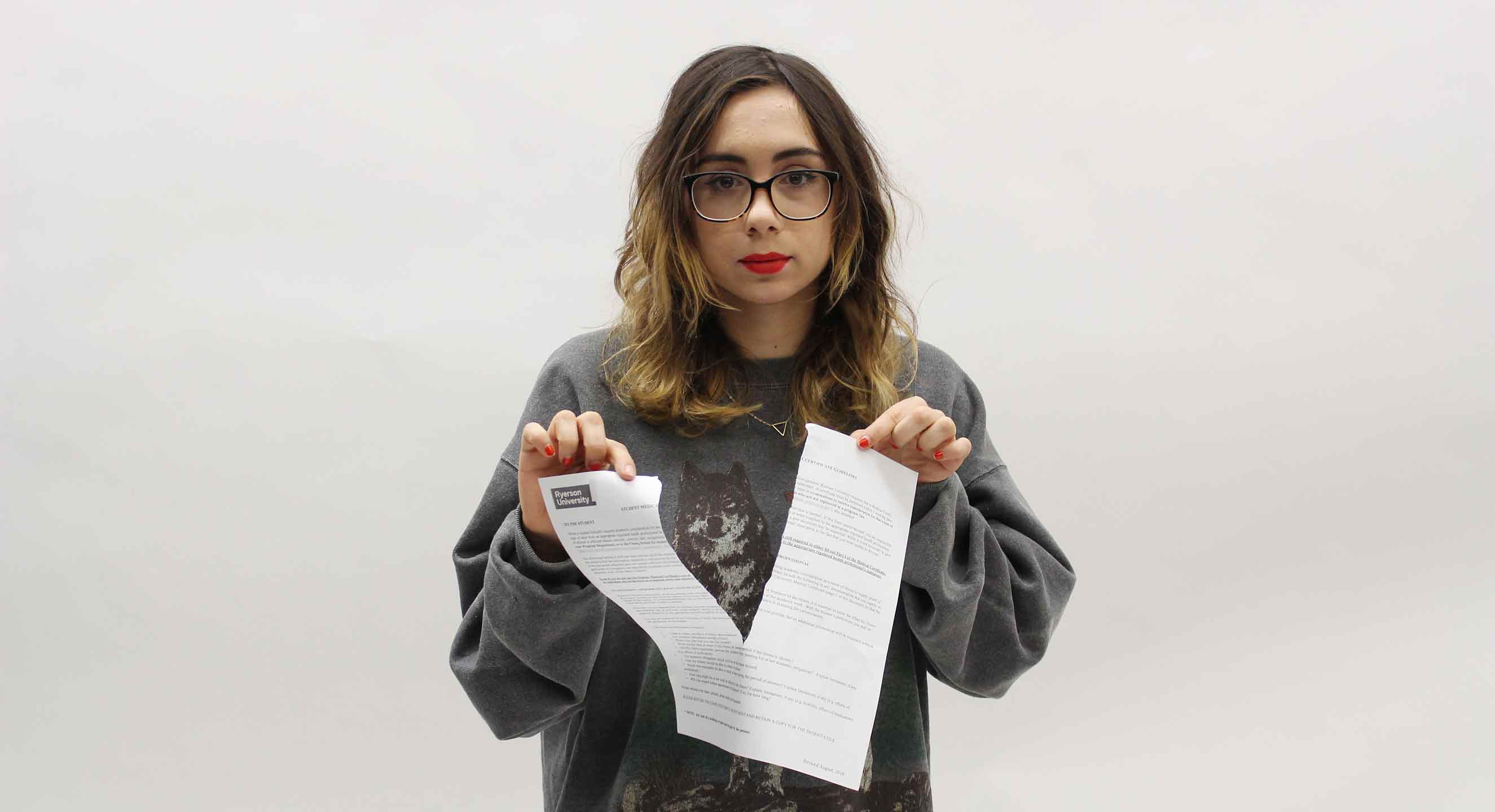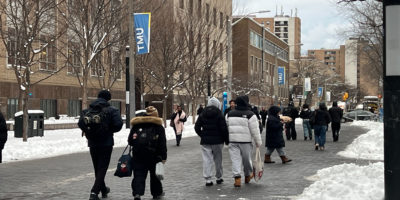By Sarah Krichel
When Kathleen Fox* got an abortion last year, Ryerson didn’t make it easy for her to get the help she needed.
The then-first-year journalism student told The Eyeopener about her experience, and how she dropped two courses because she couldn’t get her required accommodations.
Fox said that the day she went for her abortion procedure, the clinic had a medical note ready for her. But the note only covered her for that day.
Two days later, Fox’s body began releasing blood clots. She missed her five-hour lab to go to the Ryerson nurse’s office, where she was told “it wasn’t a walk-in” and that she needed an appointment. She left without a medical note.
“I just feel like it was a very do-it-yourself process,” she said.
Ryerson’s academic policy review committee (APRC) is working on improving five different policies surrounding academic accommodations so that students like Fox won’t have to deal with inadequacies in the current system, like having to compromise their marks.
Academic accommodations and considerations refer to several measures that aim to help students who need additional support. This covers illnesses, disabilities, grief periods, prejudice, procedural errors in evaluations or religious and spiritual holidays. Last year, 2,033 students registered for academic accommodation support, according to Marc Emond, acting assistant director of academic accommodation and learning.
But there’s no deadline to bring policy reform to the Senate. Ryerson students will continue to endure the complicated processes of getting the help they need when dealing with unanticipated life experiences; from a cold to a death in the family.
According to Marcia Moshe, interim vice-provost academic, extensive consultation needs to take place before the proposals can be brought forward. Because the policy needs to address all specific cases and the various parties involved (student, instructor, chairs, senate), Moshe said the committee needs time to review things thoroughly.
In the meantime, students are dropping courses and losing money. Soon after her experience with the nurse’s office, Fox said she saw a counsellor (she got the appointment because of a cancellation). She said the counsellor suggested they make a formal complaint about the earlier incident.
According to Moshe, a student is only required to disclose the way their condition impacts their academic capability, but not the condition itself. The student medical certificate only requires the “general nature and effect of illness and treatment.”
Fox ended up going to an off-campus walk-in clinic to get a medical note. The woman who saw her told her she had previously dealt with Ryerson medical notes.
“She told me she hated filling out Ryerson medical notes because they just don’t accept vague answers, it has to be specific,” Fox said. “In the case of a sort of sensitive condition like an abortion, I don’t necessarily want all my professors to see that.”
Fox said the note she did get didn’t help. “I still had to reach out to my profs and essentially explain the whole situation all over again. The note might as well have not existed,” Fox said. “I was in tears … It was just very emotional for me having to explain myself to so many different people.”
Fox said that if the note had been properly circulated to her professors, she wouldn’t have had to drop two courses without getting a refund.
One of the other issues that the APRC is reviewing states that students who feel unsatisfied with an instructor’s evaluation may submit a written request that explains why the work warrants a higher grade.
Muneev Javed, a first-year engineering student, said that inconsistencies in the way teachers’ assistants (TAs) evaluate student work leads to unfair results.
For his calculus midterm, Javed said a student with a different TA used the same steps to get the same answer, but was given a better mark.
He eventually went to the professor’s office for a reevaluation and said he was given two more marks by the professor, but still ended up with a lower grade.
“At the end of the day, I can’t do anything about it,” he said.
“[University] is like, you either get lucky or you don’t get lucky,” Javed said in regards to the school’s marking scheme.
Javed added that he knows students who use medical notes to postpone their exam to get a better idea of what to study from other students.
Jake Friedman, co-chair of the APRC and chair of the mechanical and industrial engineering faculty, said the large amount of medical notes he gets is his biggest concern, since many professors have to set multiple makeup exams. He added that he has received reports from students saying that they feel their notes are being met with skepticism, since many students manipulate the current system.
“We don’t want students feeling that way. And we certainly don’t want faculty feeling that all medical notes are bogus,” Friedman said, adding that if a note is signed by a physician, faculty cannot deem it illegitimate.
John Turtle, secretary of Senate, said that there are controversial instances where the student and the faculty can’t come to an agreement regarding the accommodation. He added that many schools have different systems when it comes to academic policies, such as paying for a reevaluation request from an instructor, or self-declaring illnesses serious enough to be accommodated academically.
“We’re in the middle of the road on many of these things,” Turtle said. “But we’re certainly not behind … I think we have students at heart when we make many of these decisions.”
“The review process is very transparent, very consultative, trying to arrive at the best way to deal with this in a non-punitive, but educationally-focused way,” he said.
The committee is working with representatives from the Ryerson Students’ Union (RSU), the Continuing Education Students’ Association of Ryerson (CESAR), as well as taking student recommendations through town hall meetings.
Exam policies and course management policies are also under review by the APRC. These include consideration for students during the examination process, and course outlines and management.
“I don’t have answers, but we want to be sure that those who are legitimately ill are in fact given academic consideration,” Moshe said.
*Some names have been changed to preserve anonymity.












Megan
There is such a lack of compassion and understand for medical conditions at Ryerson, its alarming. And disheartening. I suffered a severe concussion during the winter 2016 semester and the process of getting consideration and extension was long and arduous. I didn’t feel that my professors believed me despite multiple doctors notes and it wasn’t until I had a MRI done that I felt there was any real understanding. I also felt pressured to accommodate professors timelines with my extension which resulted in me pushing myself to study and do work well before I was ready. I, of course, ended up with marks that I’m not happy about but I passed. There needs to be a serious overhaul about how faculty react and accommodate the pressures of life. This is a university, we are paying for it and we are not treated like people who occasionally deal with real problems. Days before my concussion, my dad suffered a stroke and I had to send photos of the ER to prove I wasn’t skipping a lecture for no reason. The entire experience left a sour taste in my mouth.